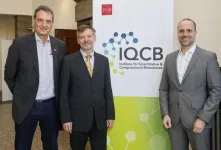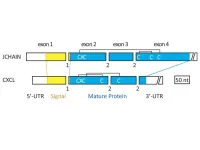(Press-News.org) Peer-reviewed - Survey
Rebuilding trust in fisheries governance will be vital to create a sustainable industry post-Brexit England, according to new research.
Strong trust between managers and fishers is essential for achieving sustainable fisheries, but new research from the University of East Anglia has found worryingly low levels of trust in fisheries following the UK’s departure from the European Union.
The survey pioneered a methodology assessing different elements influencing trust. It revealed perceived incompetence, indifference to fishers' livelihoods, and inadequate consultation as major drivers of fishers' distrust towards fishery regulators.
Lead researcher of the Pyramids of Life project Dr Silvia Ferrini, of the Centre for Social and Economic Research on the Global Environment (CSERGE), at the School of Environmental Sciences at the University of East Anglia, said: “We found continued low levels of trust, possibly made worse by Brexit, with further deterioration compared to previous research.”
Lead author Maximilian Dixon, also of CSERGE at UEA, added: “It is evident that a history of failing to deliver and of broken promises has undermined trust in the institutions which govern fisheries in England and that they are weakly resilient to various potential disturbances such as natural disturbances, changes in policy, performance failure or personnel turnover.
“However, there are opportunities to improve trust relations by directly involving the fishing communities in the processes of governance.
“An institutional commitment to improve trust relations and to learn from extreme events that impact the fishing industry could improve relations.”
The survey was distributed between July and August 2022 in a variety of ways using mailing lists, official social media platforms and an article in a fisherman’s newspaper, ‘Fishing News’.
It used novel methodology that allowed researchers to capture diverse types of trust and build a more nuanced picture.
Of the 94 responses collected, only 52 were complete and after removing responses from outside of England, 46 were used in the analysis, representing around 0.94 per cent of English fishers.
In particular, the research explores the effects of mass mortality of crustaceans along the coast of Teeside and Yorkshire in winter 2021, which heavily impacted the fisheries sector, including commercially important crabs and lobsters.
The survey found that the way it was handled by the Northern Eastern Inshore Fisheries and Conservation Authorities (NEIFCA) and Defra, and a subsequent string of reports into the cause will likely have affected trust relations, with elements such as transparency, competence and communication playing a large role in the conflict.
However overall, local institutions inspired relatively more trust, benefiting from better communication.
Co-researcher Dr Gaetano Grilli, Lecturer at UEA’s Norwich Business School, said: “Improved communication between fishers and local fishery officers could rebuild trust, enhancing confidence in institutions' competence and commitment to fishers' futures.
“This foundation of trust at the local level is pivotal for the co-operative management needed to ensure the long-term sustainability of England's fisheries.”
The research was in co-operation with Dr Rosalind Bark, Associate Professor in Ecological Economics at UEA’s School of Environmental Sciences, and Dr Bryce Stewart, Reader at the University of York’s Department of Environment and Geography. It was supported by UK Research and Innovation’s Sustainable Management of Marine Resources programme, the Pyramids of Life: Working with Nature for a Sustainable Future project and also involved the University of Siena, in Italy.
‘The importance of rebuilding trust in fisheries governance in post-Brexit England’ is published in Marine Policy.
END
New research finds concerningly low levels of trust in fisheries institutions post-Brexit
2024-01-30
ELSE PRESS RELEASES FROM THIS DATE:
Mapping cell behaviors in high-grade glioma to improve treatment
2024-01-30
PHOENIX — High-grade gliomas are cancerous tumors that spread quickly in the brain or spinal cord. In a new study led by Mayo Clinic, researchers found invasive brain tumor margins of high-grade glioma (HGG) contain biologically distinct genetic and molecular alterations that point to aggressive behavior and disease recurrence. The findings suggest insights into potential treatments that could modify the course of the disease.
The study published in Nature Communications, profiled 313 tumor biopsies from 68 HGG patients using genomics (study of genes), ...
Using vibrator found in cell phones, researchers develop 3D tumor spheroids to screen for anti-cancer drugs
2024-01-30
Depending on their location, cancer cells within a three-dimensional (3D) tumor structure can have different microenvironments. Cells in the core of the tumor receive less oxygen (hypoxia) and nutrients than those in the periphery. These varying conditions can drive differences in cell growth rates and drug sensitivities, highlighting the need to study 3D tumor models in lab settings. Until recently, conventional methods used to create such tumor spheroids were time-consuming, produced inconsistent results and involved high setup costs.
Investigators at Brigham and Women’s Hospital, a founding ...
Research indicates nearly six million American women became pregnant from rape, sexual coercion, or both during their lifetimes
2024-01-30
Ann Arbor, January 30, 2024 – Experiencing a pregnancy from sexual violence is common in the United States, according to research conducted by investigators at the Centers for Disease Control and Prevention (CDC) reported in the American Journal of Preventive Medicine, published by Elsevier. Nearly six million women in the United States who were raped, sexually coerced (defined as non-physically forced unwanted penetration), or both became pregnant as a result. This equates to about one in twenty American ...
Festive opening of the Institute for Quantitative and Computational Biosciences
2024-01-30
Johannes Gutenberg University Mainz (JGU) recently inaugurated its new Institute for Quantitative and Computational Biosciences (IQCB) in the presence of Clemens Hoch, the Minister of Science of Rhineland-Palatinate, and Professor Stefan Müller-Stach, JGU's Vice President for Research and Early Career Academics. The IQCB is an interdisciplinary research institute at the interface between the life sciences and neighboring disciplines including mathematics, computer science, physics, chemistry, and engineering, thus generating new opportunities for research by way of, for example, computer-aided analysis of large amounts of data, computer-based ...
Researchers seek to understand how regions of 'cosmic web' influence behavior of galaxies
2024-01-30
LAWRENCE — Researchers at the University of Kansas hope to better understand intricate mechanisms behind the evolution of galaxies, which travel through a “cosmic web” of different environments during their lifespans.
Gregory Rudnick, professor of physics & astronomy at KU, is leading a team that recently earned a $375,000 grant from the National Science Foundation to study “gas content and star-formation properties of galaxies” that are altered depending on where they are moving through the cosmos.
“The primary objective of this project is to comprehend the impact of environmental factors on the transformation of galaxies,” Rudnick ...
Beating the freeze: Up to $11.5 million for eco-friendly control over ice and snow
2024-01-30
Images
New, nontoxic materials could one day keep solar panels and airplane wings ice-free, or protect first responders from frostbite and more, thanks to a new University of Michigan-led project funded by the Defense Advanced Research Projects Agency.
The research team will study biological molecules used by other living things to survive freezing temperatures. The project officially begins this week and includes researchers from Raytheon Technologies, North Dakota State University and the University of Minnesota.
Existing materials used to accomplish these feats come with serious downsides. For instance, road salts ...
A tie between the most common obesity surgeries
2024-01-30
The two most common obesity surgeries – gastric bypass and gastric sleeve – have few short-term complications and are equivalent in that sense. These are the findings of a study conducted at the University of Gothenburg.
Every year, around 5,000 obesity surgeries are performed in Sweden. The person undergoing surgery will normally have a BMI of at least 40, or 35 if they also have other serious medical conditions related to obesity.
The most common procedures are gastric bypass, where a large part ...
Study provides new explanation for why placenta may not properly separate at birth, putting mother and newborn at risk
2024-01-30
A new study led by researchers at UCLA may change the way clinicians and scientists understand, diagnose and treat placenta accreta spectrum disorder, a serious condition in which the placenta fails to separate from the uterus at birth, jeopardizing the life and health of both mother and baby.
Researchers previously believed that certain overly invasive placental cells, called trophoblasts, were responsible for keeping the connection intact. But this new research, which identifies genetic and cellular changes within single cells where the placenta ...
Ethnic disparities in cancer mortality in the capital and northeast of the State of São Paulo, Brazil
2024-01-30
Although the interior of São Paulo state (Brazil) has higher human development indices (HDIs) and fewer Black people as a percentage of the population, they account for a larger proportion of deaths from cancer in the Barretos region than in São Paulo city, the state capital, according to a study supported by FAPESP. An article on the study is published in the journal Cancer Causes & Control.
In the 18 cities of the Barretos regional health district (RHD), the number ...
Evolutionary origin of mysterious immune system molecule in humans revealed
2024-01-30
UNIVERSITY PARK, Pa. — Biological systems can behave as siblings in several ways, including by borrowing something and never giving it back. That appears to be what the human immune system did with a protein that now helps bind and regulate the subunits that make up antibodies, according to a multi-institute research collaboration. They found that, before the immune system evolutionarily co-opted it, the protein originally belonged to gene family responsible for directing cells to move to the right location at the right time to address specific functional needs.
The researchers, including Kazuhiko Kawasaki, associate research professor of ...




